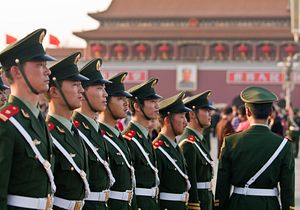This is the third installment in a series about the basic knowledge and beliefs of the Chinese People’s Liberation Army (PLA) based on its publication The Soldier’s Handbook. This week we look at famous PLA generals. The first people to know are the PRC’s Ten Great Marshals. Part Athenian strategoi, part Olympian gods, the Ten form the (mostly) incorruptible pantheon of Chinese national defense.
First in order and first in the hearts of the people is Marshal Zhu De. Like other PLA soldiers, he began as a KMT officer only to switch sides in favor of the Communists. Zhu is the PLA’s answer to Forrest Gump, participating in every major historic action throughout his life: Sun Yatsen’s movement, the Xinhai Revolution, an early adopter of Communism, the Northern Campaign against warlords, the Nanchang and Xiangnan Rebellions, the Long March, and of course the Communist Revolution. His particular stroke of luck was being too old to play either victim or tormentor in Mao’s Great Leap Forward and Cultural Revolution, allowing this old soldier to fade away gracefully.
Less fortunate was the second Olympian, Marshal Peng Dehuai. Peng fell from favor after writing a letter to Mao in 1959 criticizing the Great Leap Forward, leading Mao to label him a “right opportunist.” In practical terms, the letter was a quixotic gesture combining moral rectitude, loyalty to Mao, and a determined obliviousness to political reality. Mao had already changed course in his disastrous Great Leap campaign. What good could come of criticism after the fact? None for Peng, at least. Although posthumously rehabilitated by Deng Xiaoping, the fall from grace of one so high surely gives modern China cause for pause.
The other great tragic marshal is Lin Biao, Mao’s erstwhile successor. Unlike Peng, he benefited by toeing the Party line during the Cultural Revolution but died in a plane crash while fleeing the PRC in 1971. Chinese authorities claim he plotted to topple Mao, which seems like an entirely reasonable proposition.
In its denunciation of Lin, the Party went so far as to expose his conspiracy publicly, giving wide play to the words of his son, Li Liguo, concerning Mao: “Today he uses sweet words and honeyed talk to those whom he entices, and tomorrow he puts them to death for some fabricated crimes. … He is a paranoid and sadist.” These statements at the time were as treasonous as they were radically true. The average Chinese citizen must have been put on the spot learning the truth and then having to denounce it as a lie.
Finally, we come to the lesser-known Xi Zhongxun, a guerilla fighter in the central Shaanxi and Gansu front during the Communist Revolution. The focus of his fighting: the political front as a political commissar for major Communist units. His task was to ensure his units towed the Party line and his commander followed the Party’s direction. Although his entire career was in the military, politics was clearly his preferred domain: he rose to the rank of Vice Premier and Secretary General of the State Council, China’s cabinet. He was only denied higher office it seems by his fall from favor during the Cultural Revolution, during which he suffered persecution. His ultimate vindication has come through his son, paramount leader Xi Jinping.
The views expressed are my own and do not reflect the official policy or position of the U.S. Navy, Department of Defense, or the U.S. Government.

































